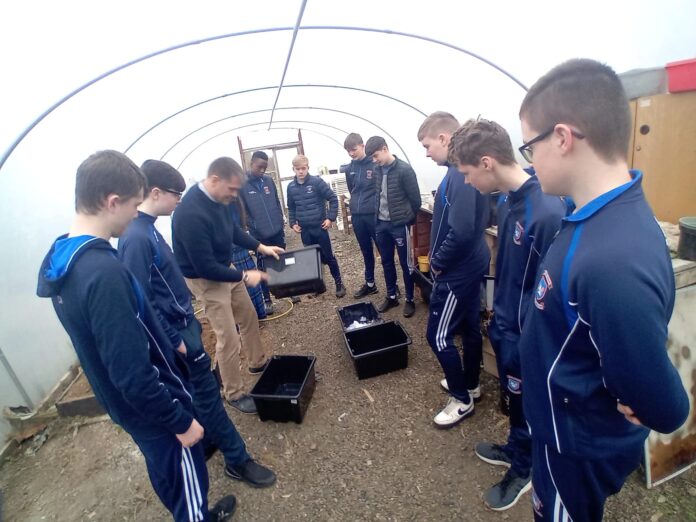
A TEACHER in Kilmallock is only delighted to announced that he and all his students have worms.
It’s not something that’s usually a proud boast, but in this case the worms are the kind that live in a ‘worm nursery’ and are turning waste from the school and local businesses into highly nutritious compost.
Brian Kelleher, EU Climate Pact Ambassador and teacher at Coláiste
Iósaef in Killmalock, has founded the Worm Academy as part of his climate action curriculum at the school.
Brian and his students have created a number of worm nurseries and towers, which are now used to break down the school’s organic waste, as well as paper waste from a number of cafe’s in the town.
“These are not earth worms. They’re called ‘Red Wrigglers’ and they produce two products, worm casts, which is a fabulously nutritious organic compost, and worm ‘tea’ which is a liquid and can be watered down to use in gardens and polytunnels,” he told the Limerick Post.
Brian believes that if the word about worms is spread, it has the potential to divert waste from landfill and even produce a green and affordable alternative to chemical fertilisers for market gardeners and small farmers.
The worms live in the top couple of inches of the soil but, with not being native to Ireland, getting started can be a bit expensive.
“They cost €55 a kilo. We could afford five kilos for the school but we knew that wouldn’t be enough so, over Christmas, all of the students in the class took home some worms and each set up a worm nursery,” Brian explained.
The result already is that the worms have dealt with three tonnes of paper and food waste produced by the school itself and three local cafés.
“The students are absolutely fantastic. There are no exams, not grades, just action, and the modules of the curriculum are driven by the students themselves. They read or hear about something and they come to me and ask to have it included. They are very clued-in,” he said proudly.
With the first 15 students about to complete the course in the junior cert cycle, 20 have taken the class in second year and 25 have signed up in first year.
The only outlay for the was the initial €200 to buy the worms and everything else was sourced within the school, using waste materials from the woodwork class, food waste, card, and paper as feed.
The school has also hooked up with the Banna Coastcare group, who are working to restore coastal dunes and will be using the fertiliser produced by the worms to grow marram grass for the project.
The project was recently given a national award by EU Conexus, coming second in the Limerick Clare Education and Training Board’s ‘Make a Switch’ competition, and participated in as finalists in the national Young Environmentalist awards.
Brian hopes to expand the work across the country and is available to talk to schools, community groups, and growers.
“There’s no danger or competition between them and native earthworms. They are kept in a very controlled, enclosed environment,” Brian said.
And Brian is happy to give everyone else worms too.
“They reproduce very happily every 60 to 90 days, so they do their own thing and in no time you have plenty of worms,” he said.


